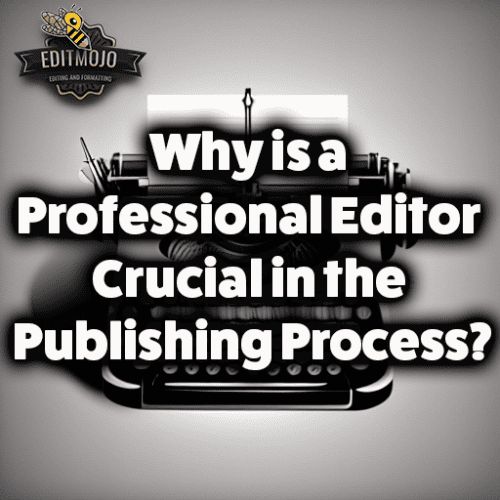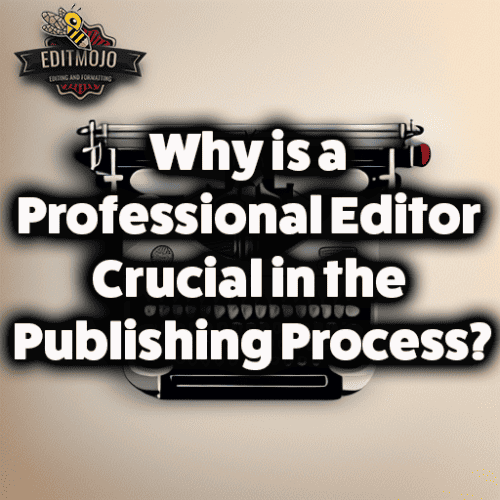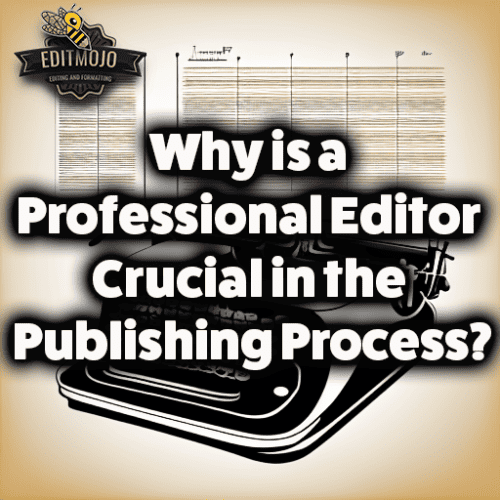Why is a professional editor crucial in the publishing process?
Why is a professional editor crucial in the publishing process? In the ever-evolving world of publishing, one stalwart presence remains: the professional editor. From developmental editors who shape the narrative’s architecture, to copy editors who meticulously fine-tune grammar and style, and proofreaders who catch the final errors, editors are the unsung heroes behind every successful publication. But why is a professional editor crucial in the publishing process? Let’s dive into this question, dispelling misconceptions and revealing the value they offer.
Key Takeaways Table
| Key Point | Details |
|---|---|
| Role of an Editor | Editors are more than grammar checkers. They actively shape and polish the narrative to enhance its quality. |
| Quality Gatekeepers | Editors ensure the credibility of the work through fact-checking, maintaining consistency, and upholding literary standards. |
| Editor-Author Relationship | This is a creative partnership that involves trust, collaboration, and shared goals. |
| Genre Expertise | Editors specialized in specific genres can provide insights and guidance that enhance the narrative’s appeal to its target audience. |
| Economic Impact | Hiring a professional editor is a strategic investment that can significantly increase a book’s sales. |
| Future of Editing | While AI and automated tools can catch basic errors, they cannot replace human editors’ ability to provide creative input and understand unique narrative voices. |
The Role of an Editor: Beyond Grammar and Spelling
Many believe an editor’s work boils down to simple grammar and spelling corrections. However, the truth is far more complex and enriching. A professional editor can help an author elevate their work, honing and polishing it until it truly shines. As legendary editor Sol Stein put it, “Editors are not potted plants.”[^1^] They are active participants, indispensable in the creative process.
Consider the case of F. Scott Fitzgerald and his editor, Maxwell Perkins. Fitzgerald’s classic, The Great Gatsby, might not have been the masterpiece we know today without Perkins’ guidance. He didn’t just fix spelling errors; Perkins helped Fitzgerald shape his narrative, refining the prose to make it more compelling.[^2^] This is a testament to the editor’s role far beyond the superficial layers of a text.
Editors as Gatekeepers of Quality
Editors are the gatekeepers of quality in publishing. They are the ones who ensure the author’s credibility by fact-checking information, maintaining narrative consistency, and upholding literary standards. As Stephen King quipped, “To write is human, to edit is divine.”[^3^]
Without professional editing, the risk of errors, inconsistencies, and misinformation in a published work increases significantly. Consider the fiasco with A Million Little Pieces by James Frey, initially hailed as a memoir and later revealed to contain numerous fabrications[^4^]. A more thorough editing process could have prevented the subsequent fallout and protected the credibility of everyone involved.

The Editor-Author Relationship: A Creative Partnership
The editor-author relationship is a unique form of creative partnership. It’s akin to a dance, a collaborative effort where both parties move together towards a common goal: producing the best work possible.
J.K. Rowling’s bond with her editor, Barry Cunningham, played a significant role in the success of the Harry Potter series. Cunningham’s keen editorial guidance and Rowling’s storytelling prowess made for a potent combination[^5^]. The editor’s input can be a gentle hand guiding the author, helping shape their vision without overshadowing their voice.
The Importance of Editor’s Expertise in Specific Genres
Every genre has its unique tropes, styles, and reader expectations, making an editor’s expertise in a specific genre invaluable. An editor experienced in sci-fi will have a vastly different skill set than one who specializes in romance or non-fiction.
Consider the example of George R.R. Martin and his editor, Anne Groell. Martin’s sprawling epic, A Song of Ice and Fire, benefits immensely from Groell’s understanding of the fantasy genre. Her expertise allows her to guide Martin in crafting a narrative that resonates with his target audience[^6^]. The wrong editor for the genre could fail to capture these nuances, potentially resulting in a disservice to the story.

The Economic Impact of Professional Editing
While hiring a professional editor requires an upfront cost, it’s a strategic investment that can lead to significant returns. A polished, well-edited book is more likely to receive positive reviews, attract a larger readership, and therefore generate more sales.
In a study conducted by Self-Publishing School, books that underwent professional editing sold 68% more copies on average than those that didn’t[^7^]. This stark difference underscores the economic benefits that a professional editor can bring to the table.
The Future of Editing in the Age of AI and Automated Grammar Checkers
As technology evolves, we’re seeing a rise in AI and automated grammar checkers like Grammarly or Hemingway App. These tools are excellent for catching basic grammar and spelling errors, but they lack the human touch.
An AI can’t understand your unique voice, detect subtle nuances, or provide creative input to improve your narrative. While technology is improving, it’s hard to envision AI replacing the role of human editors any time soon. As famed sci-fi author Philip K. Dick noted, “The true sign of intelligence is not knowledge but imagination.”[^8^] And that’s an area where human editors remain unmatched.

Conclusion (Why is a professional editor crucial in the publishing process?)
In a nutshell, professional editors are pivotal in the publishing process. They play numerous roles: quality gatekeepers, creative collaborators, genre specialists, and strategic economic assets. In an era where AI and automated tools are increasingly prevalent, the value of a professional human editor remains irreplaceable. So, next time you pen your masterpiece, remember to consider a professional editor’s invaluable input. It might be the difference between a good book and a great one.
[^1^]: Sol Stein on Writing
[^2^]: Maxwell Perkins and F. Scott Fitzgerald
[^3^]: On Writing: A Memoir of the Craft by Stephen King
[^4^]: A Million Little Pieces Scandal
[^5^]: J.K. Rowling and Barry Cunningham
[^6^]: Interview with Anne Groell, George R.R. Martin’s editor
[^7^]: Self-Publishing School study
[^8^]: Philip K. Dick Quotes
Top Five Questions and Answers Table (Why is a professional editor crucial in the publishing process?)
| Question | Answer |
|---|---|
| Why is an editor more than a grammar checker? | An editor actively shapes and polishes the narrative, enhancing its quality and ensuring it resonates with the target audience. |
| How does an editor ensure the credibility of a work? | Editors fact-check information, maintain narrative consistency, and uphold literary standards to ensure the work’s credibility. |
| Why is the editor-author relationship important? | This relationship is a creative partnership where both parties work together towards producing the best work possible. Trust and collaboration are key elements. |
| Why does an editor need to be familiar with the genre of a book? | An editor familiar with a specific genre can provide insights and guidance that enhance the narrative’s appeal to its target audience. |
| Can AI replace human editors? | While AI can catch basic errors, they cannot replace human editors’ ability to provide creative input, understand unique narrative voices, or maintain the quality of a work. |
